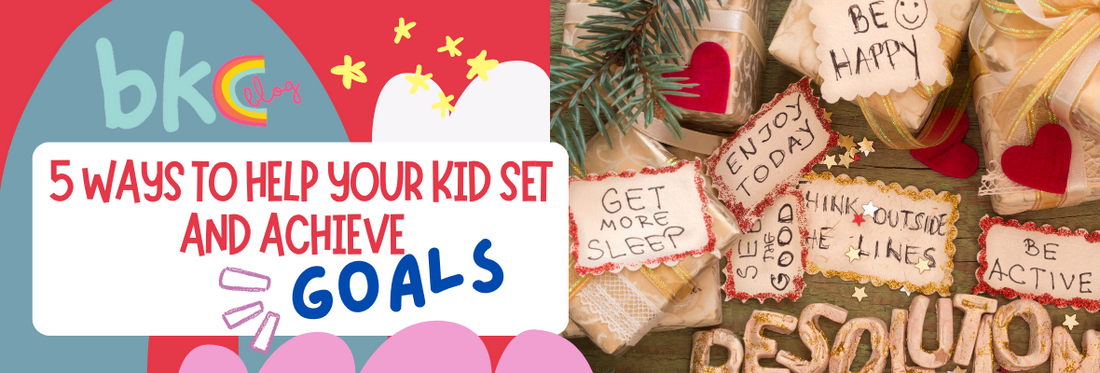Was your child all excited about setting a goal as they entered the New Year? Did you want your child to make a healthy, realistic resolution on their birthday? Read on to understand how you can help your child to keep pursuing their goals successfully.

While the calendar year has already begun, there is no better time than now to start new habits, pick new hobbies, or develop new skills. Unfortunately, our resolutions – regardless of whether they were made at New Year’s Eve, summer solstice, or the middle of the year – usually fade into obscurity sooner than you think. It shouldn’t come as a surprise to you if your child – who was very excited about making their resolution – isn’t too keen on making good on it.
But that shouldn’t be the end of it either. Research shows that habits formed in childhood have the potential to become lifelong rituals. As a parent, the key is to set healthy goals for your child. And to be realistic about keeping them.
Making healthy resolutions and integrating them to your child’s daily routine has its benefits.
-
Your child learns how to set realistic goals and work towards achieving them.
-
It teaches them responsibility.
-
They could develop a new skill or hobby over time.
-
Setting goals builds a sense of self-awareness and thereby instils confidence and independence in your child.
-
Learning to follow their goals helps cultivate discipline.
As you read on, we give you a lowdown on how to set realistic goals for (and with) your child.
Resolutions for Your Kids
The first step toward setting goals for the year is to identify areas your child can work on. This process can be an annual fun goal-setting activity with just the immediate family members present.
If your child is a preschooler, they would need help with setting their goals. You could note down a few ideas and pick one or two goals together. It is very important that the resolutions are age-appropriate and fun to execute.

Ask yourself the following questions when narrowing down resolutions:
-
Is it a positive change that can be easily executed by your child?
-
Is it a specific goal?
-
Is it something they can achieve realistically?
-
Will they enjoy doing it in the longer run?
-
Can they track their progress?
-
Is it relevant for their age and developmental needs?
If the answer is ‘yes’ to all, you are on the right track.
Children above five years of age are old enough to understand resolutions and goals. They can be active participants in the process and choose goals on their own. However, they would still need your guidance on keeping them specific and achieving them.
You will find some broad resolution ideas below to brainstorm with your kids. As all of these are broad areas, start small with specific age-appropriate goals. Progress to complex goals as your child grows older. We have also listed down examples for each age group.
1. Personal Hygiene
Maintaining personal hygiene is not just about fighting germs and illnesses. It boosts your child’s self-esteem and confidence. That is why it is essential to build hygiene habits from a young age. If you are finding it difficult to incorporate these practices into their daily schedule just like that, setting them as goals helps.

Preschoolers: “I will wash my hands with soap before each meal and snack time.”
Kids aged 5 to 12: “I will organise my desk and keep my room tidy” or “I will brush and floss my teeth twice a day.”
Teens: “I will trim my nails properly and regularly.”
2. Household Chores
Sharing house chores helps strengthen the familial bond. For your child, it assuages any sense of insecurity at home and makes them feel responsible.
One thing parents need to keep in mind when assigning household chores is to: keep ‘em fun. If you have multiple kids with different chores assigned, it would help to maintain a comprehensive chore chart. You can find plenty of chart templates on Canva.

Preschoolers: “I will put the toys back in the baskets and shelves when I am done playing with them” or “I will help set the table before mealtime.”
Kids aged 5 to 12: “I will help clear the table and wash the plates after mealtime.”
Teens: “I will help fold the clean laundry” or “I will help with the preparation of at least three meals every week.”
3. Healthy Eating & Lifestyle Habits
We all know that eating healthy and being active aids good health, physical growth, and mental wellbeing. But your kid might not agree to the taste of the healthy greens or to the icky feeling of sweat trickling down their forehead. That’s why setting a goal might be the perfect nudge.

Preschoolers: “I will try new foods” or “I will ride my cycle everyday.”
Kids aged 5 to 12: “I will drink eight glasses of water everyday, even when I am at school” or “I will drink smoothie drinks over fizzy drinks for a month.”
Teens: “I will eat a few servings of fruits and vegetables every day” or “I will try to sleep for at least eight hours everyday.”
4. Goals to Develop Empathy
Empathy is a complex emotion. While it starts from infancy, a child starts to genuinely understand other people’s feelings only when they are around two years of age. But the empathetic part of the brain fully develops only by the age of 21.
Being empathetic is a conscious, patient effort up until this age. And practice makes one perfect.

Preschoolers: “I will be nice to the kids in my kindergarten class” or “I will share my things when my classmate doesn’t have them.”
Kids aged 5 to 12: “I will be friendly to all animals” or “I will give away some of my clothes that are still in good condition.”
Teens: “I will try to understand the feelings of my siblings and not fight with them” or “I will help get groceries for the elderly people in my gated society.”
5. A New Hobby or Skill
Hobbies and other activities help develop a child’s personality and interests. What better way to start a hobby or learn a new skill!
If you are hoping to let your child learn something new altogether, take your child’s interests into account. We suggest you set small, reasonable goals for a small period of time. That way, if they change their mind about pursuing it further, you won’t have invested a lot of time and financial resources.

Preschoolers: “I will sketch and colour in the evenings.”
Kids aged 5 to 12: “I will enrol for piano lessons.”
Teens: “I will attend a baking workshop during my holidays.”
6. Academic Goals
As your child progresses through school, they are expected to reach certain educational goals to ace each class. Setting academic-related goals in the new year helps your child stay motivated and focused.
Parents, sometimes, get carried away when setting academic goals for their kids. It is absolutely crucial to not teach your child concepts that they aren’t developmentally ready for. For instance, it is not advised to try and teach your child to read before they can even identify and recognise pictures, which is around the age of three.
Therefore, make note to set goals that are well within your child’s developmental stage. You can take a look at their school curriculum when doing this.

Preschoolers: “I will listen to what my teacher says” or “I will learn 100 new words this year.”
Kids aged 5 to 12: “I will do my homework and revise what I learnt everyday” or “I will learn the multiplication table of 4 by the end of March.”
Teens: “I will read a book every month” or “I will read the lesson portions the teacher will cover in class, ahead of time.”
Help Your Child Stick to Their Goals
Now comes the hard part.
Like all of us, your mini-me also struggles to continue pursuing their goals within the first few weeks of starting. All is not lost when they lose their zeal about their resolutions; a few steps can get them back on track.
1. Let Your Child Be Their Own Goal-Setter
Even when you brainstorm together for resolution ideas, give your child the opportunity to decide. If the goal is a bit broad (“I want to swim to the deep end of the pool without a float”), you can guide them with questions (“How can you do that? How will you achieve this?”) to keep it specific (“I will swim everyday in the morning until I am confident”).
2. Make It Fun
This is especially important for young children. You can set up a rewards system at home with something as simple as a sticker chart that serves as positive reinforcement for your child.
Here is how: Each time your child actively works to achieve their set goal, they earn a sticker. Proactive effort gets a big puffy sticker and positive attention. If you had to insist they make good on their resolution, they get a smaller sticker. If your child almost misses their set goal a day, remind them and encourage them. You can also promise them a bigger reward if they can complete 10 days or two weeks on the sticker chart.
The bigger reward need not cost you money. You could let them choose the movie for your family movie night, the restaurant when the family dines out the next time, or even a later bedtime to finish reading their favourite book.

3. Be Role Models to Your Children
Practise what you preach. Lead by example. If you want your child to follow their resolutions without fail, show them how it is done by doing it yourself.
Better yet, you could resolve to do the same thing your kid chooses. If they want to go running every morning, your resolution can be: “I will try to run a total distance of 25 km this month.” That way, both of you can pursue goals together and hold each other accountable.
4. Don’t Nag
It is important to have a positive outlook towards keeping resolutions. Following up regularly becomes counter effective. At the end of each week, you could hold fun family meetings where you can take stock of everyone’s ‘resolution situation’.
If your child hasn’t been able to follow their resolution, try to understand the reason and validate their feelings. Understand what you can do to get them to be excited again.
If they have to put too much effort, try to take some of the load off. If your child has set their heart on more than one goal, bring the number down. Sometimes less is more.
If your child wants to follow another goal (“I want to learn how to dance”), ask them to give the current goal (“I will swim everyday in the morning”) another try before switching. Ask them what their bigger goal is (“You wanted to swim to the deep end of the pool without a float. Do you still want to do that?”). Be understanding; there is nothing wrong with changing one’s mind.

5. Take a Break
If your child wants to stop pursuing their goal for a brief time, that’s fine too. For instance, your child might not want to follow their resolution during holidays. You could gently nudge them to restart after sometime.
Keeping resolutions is not a small matter. If most adults fail at it, can you imagine how difficult it is for kids? Sticking to resolutions takes work.
Remember, research shows that it takes at least 21 days to make something a habit. Regardless of whether your child decides to pursue their goal further or decides to stop midway, be your child’s biggest cheerleader. Embrace your kiddo’s accomplishments for getting this far.

